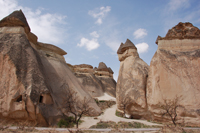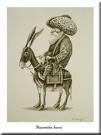The test of strength
Fairy Tales passed on by word of mouth
from Uchisar in Cappadocia
Fairy Tales and Legends
from Cappadocia

The Residence of
the Gods - Argeus
The Legend of Mahsen
Donation from the Vizier
The Clairvoyant
Jinns and Fairies
The Muhtar of Uçhisar
An Extraordinary Discovery
The Test of Strength
A Musical Contest
Hacı Bektas
The Wise Dervish
Memories of the Village Elders
Stories of their life

Fairy Tales from Turkey
Nasreddin Hoca - Anekdotes

The Test of Strength
Once there was a trader from Uçhisar who travelled from village to village with his wagon pulled by a strong bull. Every day, early in the morning, the man led his beast out of the stable, yoked it up in front of the wagon and slowly left the village. In winter, the deep snow and in summer the burning sun made each journey a hard undertaking. The two of them made their way to Ortahisar and Ürgüp, Çavuşin and Göreme, up hill and down dale, following the dusty road. The wagon was filled with all kinds of goods, pots and pans, earthenware and metal, brooms, forks and spades, in short everything that was needed by the villagers. The bull had to tug hard to move the vehicle, so the trader walked next to it, only once in a while having to use force to drive the animal when the climb towards a peak became too arduous.
The years went by, and the trader's days passed in the same way. He still sold his goods in the villages of
Suddenly, in the middle of the road, the bull struggled, fell and died on the spot. There was the man, with all his goods, the wagon and the dead animal, which had served him so well for many years, earning his and his family's living. Kneeling next to the bull, the trader slowly removed the harness and tied it around his own shoulders. Patting the animal one last time he then started pulling the cart himself.The man tugged and dragged; the sun was burning down and with each step the wagon moved a bit further. Sweat was running down his face and into his burning eyes and his wet shirt hung on him, glued to his body. He kept his eyes closed in agony and his thoughts wandered off to the dead bull, now lying beside the road. When the man was climbing a steep track he had to stop to rest; and going down from the peak was no easier. The heavy wagon pushed him from behind and to slow the vehicle he had to push his feet deep into the dust of the road.
When the unusually drawn cart came closer to Uçhisar the man stood still for a moment, summoned up all his strength, took a deep breath and with his last energy entered the village. Once there, he could not take any more and he had to stop. Immediately the Uçhisar villagers came running, surprised by what they saw. "Trader, tell us what happened to your bull?" they asked curiously. The poor and exhausted man tried to explain about the death of his bull and that he had to pull the wagon by himself. The men standing around him smiled at each other, nodded their heads and then one patted the trader’s aching back and said: "Really and truly, you were pulling your wagon like a bull!" From that day on, the man was called Camızoğlu, son of the bull.
With the declaration of the